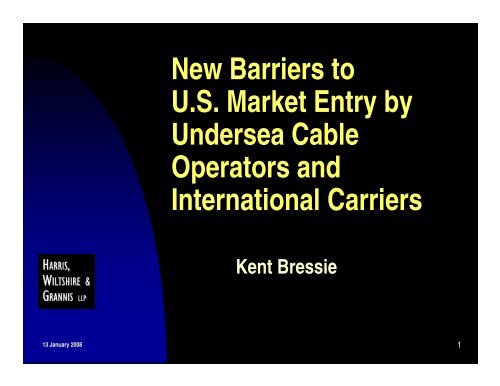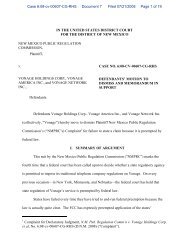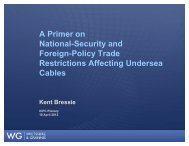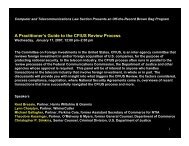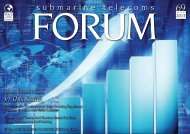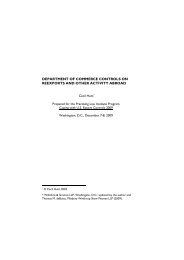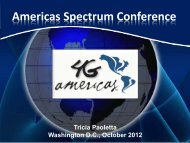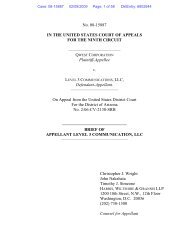What Is âTeam Telecomâ? - Wiltshire & Grannis LLP
What Is âTeam Telecomâ? - Wiltshire & Grannis LLP
What Is âTeam Telecomâ? - Wiltshire & Grannis LLP
- No tags were found...
Create successful ePaper yourself
Turn your PDF publications into a flip-book with our unique Google optimized e-Paper software.
New Barriers toU.S. Market Entry byUndersea CableOperators andInternational CarriersKent Bressie13 January 20081
Recent regulatory developments in the UnitedStates have made it increasingly burdensometo construct and operate underseatelecommunications infrastructure:• Expanded scope and depth for TeamTelecom security reviews• More expansive, politicized CFIUS reviewsfor mergers and acquisitions• Unworkable new FCC environmentalrules for cable landing licenses• Continuing failure of FCC to reform IBCfees13 January 20082
1. Expanded Scope and Depth for “TeamTelecom” Security Reviews• Team Telecom agencies haveexpanded their use of securityagreements and other assurances, andseek to impose ever more burdensomeobligations on facilities owners andservice providers over the course oftime-consuming negotiations.13 January 20083
Team Telecom2<strong>What</strong> <strong>Is</strong> “Team Telecom”?• Team Telecom is the nickname for the ExecutiveBranch agencies that scrutinize national security andlaw enforcement aspects of applications filed with theFederal Communications Commission (“FCC”):• Departments of Justice, Homeland Security, andDefense• Federal Bureau of Investigation (though not recently)• Team Telecom seeks to protect governmentcommunications, preserve government wiretapping andsurveillance capabilities, prevent terrorist acts, anddeter money laundering and drug trafficking• Team Telecom does not act pursuant to any particularlaw, has adopted no formal regulations, and retainssubstantial power and discretion13 January 20084
Team Telecom3<strong>What</strong> Does Team Telecom Review?• Team Telecom scrutinizes both applications for newFCC authorizations (including international Section 214authorizations, cable landing licenses, and mobile andsatellite licenses) and for FCC consent to acquisitionsof existing telecommunications infrastructure• Examples: new cable landing license for Trans-Pacific Express; VSNL acquisition of Tyco GlobalNetwork• Foreign Ownership Threshold: Team Telecomautomatically reviews an application for a new licenseor transaction approval if applicant or acquirer hasdirect or indirect foreign ownership of 10 percent ormore• An application will receive even greater scrutiny if theapplicant is foreign-controlled or if there is foreigngovernmentownership (including ownership through asovereign wealth fund)13 January 20085
Team Telecom5<strong>What</strong>’s in a Security Agreement?The content of the security agreement varies bytransaction/investment, but typically:• Restricts the location of infrastructure and routingfor U.S. communications;• Requires the storage of customer and call data inthe United States;• Requires compliance with lawful surveillancerequests by U.S. law enforcement agents;• Prohibits foreign surveillance using U.S.infrastructure;• Imposes U.S. citizenship requirements for principalcontacts and security officers, and other screeningprocedures for other employees and even visitorsto certain facilities; and• Imposes auditing and reporting obligations.13 January 20087
Team Telecom6Recent Changes in Team TelecomReviews• Scope expanded to cover resellers, even thoughunderlying facilities owners may be U.S.-owned orhave separately entered into assurances or securityagreement.• Increasing concern about sovereign wealth fundsand offshore private equity funds.• Where CFIUS foreign ownership review alsorequired under Exon-Florio statute, CFIUS andTeam Telecom reviews are integrated.• Team Telecom has, however, shown new flexibilitywith consortium-owned infrastructure; requiredonly Verizon, and not Asian carrier-owners, to signsecurity agreement for Trans-Pacific Express.13 January 20088
2. More Expansive, Politicized ForeignOwnership Reviews for Mergers andAcquisitionsReviews significantly altered by 2007amendments to Exon-Florio law:• Expanded scope, covering a broader range oftransactions, including those involving criticalinfrastructure and homeland security.• Further politicized, with greater congressionaloversight• Increased risks of delay and denial for coveredtransactions• Significant new ongoing complianceobligations.13 January 20089
CFIUS / FINSA2FINSA Amends Exon-Florio Statute• Following Dubai Ports World’s acquisition of P&OPorts in 2006 (later unwound) and China NationalOverseas Oil Corporation’s proposed acquisition ofUnocal (never consummated), the U.S. Congresspassed the Foreign Investment and NationalSecurity Act of 2007 (“FINSA”), which the Presidentsigned into law.• FINSA amends the Exon-Florio statute and makessignificant changes to the transaction reviewprocess administered by the Committee on ForeignInvestment in the United States (“CFIUS”).• FINSA amendments took effect on October 24, 2007.• CFIUS must publish new implementing regulationsby January 22, 2008.13 January 200810
CFIUS / FINSA3Expanded Focus on Homeland Securityand Critical InfrastructureSpecifically defines “national security” to include“homeland security” and protection of:• “critical infrastructure,” which includes “systems orassets, whether physical or virtual, so vital to theUnited States that the incapacity or destruction ofsuch systems or assets would have a debilitatingimpact on national security,” and• “critical technologies,” which include (rathertautologically) “critical technology, criticalcomponents, or critical technology items essentialto national defense.”13 January 200811
CFIUS / FINSA4Extended Reviews in Many Cases13 January 2008Requires a 45-day investigation (beyond the initial 30-dayreview) where:(1) a foreign government or a foreign-governmentcontrolledentity is a party to the proposedtransaction, unless Treasury Secretary (or hisdeputy) and head of lead agency (selected basedon subject-matter expertise) jointly determine thatthe transaction will not impair national security;(2) national security threat has not been mitigatedduring initial review;(3) foreign control of any critical infrastructure couldimpair U.S. national security, unless allegedimpairment has been mitigated during the initialreview; or(4) the lead agency and CFIUS concur that aninvestigation should occur.12
CFIUS / FINSA5“Evergreen” Provision• CFIUS or President may reopen aninvestigation at future date if a party (1)submits false or misleading materialinformation to CFIUS or (2) materiallybreaches a negotiated mitigationagreement.• CFIUS or President may order adivestiture if “there are no other remediesor enforcement tools available to addresssuch breach.”13 January 200813
3. Unworkable New FCC EnvironmentalRules for Undersea Cables• FCC has adopted new coastalmanagement rules that could greatlydelay the issuance of cable landinglicenses for new undersea cables—ofcritical importance for Asia-Pacificconnectivity.13 January 200814
FCC / CZMA2<strong>What</strong> is the Coastal Zone Management Act(“CZMA”)?• CZMA is a federal statute allowing states torequire that federal permitting and licensingactions affect state coastal zone be “consistent”with state coastal management program• States may listed federal activities subject toconsistency reviews, and also review “unlistedactivities”• No state has listed cable landing licenses, thoughstates could review them as “unlisted activities”• States don’t need special FCC rule to conductconsistency reviews; in fact, states and FCCoperated without such a rule for 35 years• NOAA opposed FCC’s recent rule proposals13 January 200815
FCC / CZMA3New Note to Section 1.767(a)(10) of FCCRules• Operator must determine whether it isrequired to certify to the state(s) wherethe cable lands that its proposedactivities will comply with the enforceablepolicies of the coastal managementprograms of the relevant state(s)• If state(s) require consistencycertification, certification must beincluded as part of FCC application• Rule took effect on October 25, 200713 January 200816
FCC / CZMA4New Certification in Section 1.767(k) ofFCC Rules• Applicant must certify that “the submarinecable system will not be located in any stateswhere the cable landing licenses may besubject to the consistency certificationrequirements of the Coastal ZoneManagement Act, 16 U.S.C. 1456.”• Rule will take effect in early 2008• Workaround: As certification requirementnot yet effective, applicants have stated thatthey are “aware of and will comply with therequirements of the Coastal ZoneManagement Act of 1972, as amended(“CZMA”), and the National Oceanic andAtmospheric Administration’s CZMAimplementing rules, codified at 15 C.F.R. Part930 Subpart D.”13 January 200817
FCC / CZMA5Harms Posed by FCC’s New CZMA Rules• Uncertainty: state authority to review unlistedactivities means that an operator cannot know if astate will take issue with a particular cable• Delay: rules could easily delay grant of cablelanding license by 6 months or more• Deprives operators of ability to signal toinvestors and lenders that a submarine cableproject is consistent with U.S. foreign policy,national security, telecommunicationsconnectivity, and competition objectives• Allows any one state to hold an entire cableproject hostage• Could re-order entire permitting process forcables13 January 200818
FCC / CZMA6Example: the Florida Paradox• Florida treats the issuance of state cablepermits as its consistency determination.• To obtain state cable permits, Florida lawrequires that a cable operator have acable landing license.• But under the FCC’s new CZMA rules, acable operator can’t get a cable landinglicense without first obtaining the statecable permits.13 January 200819
FCC / CZMA7Legal and Policy Challenges by North AmericanSubmarine Cable Association (“NASCA”)• NASCA has petitioned FCC to deferimplementation of new certificationrequirement and to reconsider andrescind all new CZMA rules.• NASCA has also challenged the FCC’scompliance with the PaperworkReduction Act and the White HouseOffice of Management and Budget.• Comments on NASCA petition dueJanuary 17, 2008; replies due January 28,2008.13 January 200820
4. Continuing Failure of FCC to ReformInternational Bearer Circuit (“IBC”) Fees• Current fee methodology createssignificant economic distortions andconfusion in international capacitymarkets.13 January 200821
FCC / IBC Fees2<strong>What</strong> are IBC fees?• FCC assesses annual regulatory fees onactive international capacity; in 2007, the ratewas $1.05 per 64 KB circuit or circuitequivalent.• Fees due each September for capacity sold inprevious calendar year (so fees for capacitysold in 2006 were due in September 2007).• A cable operator must pay IBC fees forcapacity sold to all customers except thoseholding international Section 214 authority (as214 holders must themselves pay—FCC seeksto avoid double-payment).13 January 200822
FCC / IBC Fees3When must an undersea cable operator pay fees?Obligation of a non-common-carrier undersea cable operator topay IBC fees applies regardless of:• “country of incorporation or organization of either theentity holding a cable landing license issued by theCommission, or of that licensee entity’s ultimatecorporate parent.”• whether the licensed operator sells capacity directly or“through an through an affiliated sales or marketingsubsidiary,” even if the affiliate is organized in a foreigncountry or has no commercial presence in the UnitedStates• “whether the operator sells the capacity on a lease or IRUbasis”• “the nature of the services its customers provide usingsuch capacity,” whether voice or data.Facilities-based international Section 214 holders must also pay.Source: FCC Public Notice, DA 04-2027 (July 6, 2004)13 January 200823
FCC / IBC Fees4Why Capacity-Based Fees Make No Legal orEconomic Sense• Contrary to Section 9 of Communications Act, capacity-basedfees bear no relation to FCC efforts to regulate undersea cables,which in fact is characterized by deregulation• In last 10 years, capacity prices have dropped 90 percent whilecapacity has increased 2000 percent; because fee decreaseshaven’t kept pace, fees threaten to exceed total revenues forcertain capacity offerings• Fees for 10 GB wavelength = 78 percent of revenues• By comparison, cable TV operators and wireless providers pay0.10 percent of revenues for FCC regulatory fees• Concept of “active capacity” problematic• Active capacity does not always generate revenue (e.g., ringconfiguration, backbone traffic from peering arrangements)• Methodology encourages strategic behavior (e.g., turningdown circuits on December 30th)• Operators unable to price capacity to recover the cost of IBCfees, as fees as assessed in arrears and customers object• IBC fee levels have led some carriers to route traffic outside theUnited States in order to avoid fees13 January 200824
FCC / IBC Fees5Reform Proposals• Reform proposals—based on legal, economic,and administrative arguments—have sought tomove from capacity-based fees to licensebasedfees• First proposed by Tyco Telecom in 2002• FCC came close to adopting new methodologyin 2004 and 2005, but declined in part out ofconcern that it was a “one company” issue• VSNL petitioned the FCC for new methodologyin early 2006• In August 2007, FCC deferred action on VSNLpetition; 2 out of 5 commissioners supportedconcept of rulemaking to address methodology13 January 200825
FCC / IBC Fees613 January 2008Why Hasn’t the FCC Acted?• Apathy: reform unlikely so long as FCCrecoups sufficient fee revenues and operatorsinvent extra-legal workarounds• Fear of a zero-sum game with winners andlosers among current IBC fee payers• Fear of encouraging challenges tomethodologies for other FCC fee categories• FCC may assume that no operator will take theFCC to court, or that it would win any courtchallenge• Lack of a uniform industry position, includingcriticism of or opposition to reform proposalsfrom cable operators who derive most of theirrevenues outside the undersea cable industry• Politics26
Kent D. BressieHARRIS, WILTSHIRE & GRANNIS <strong>LLP</strong>1200 18th Street, N.W., Suite 1200Washington, D.C. 20036-2516U.S.A.+1 202 730 1337 office+1 202 460 1337 mobile+1 202 730 1301 faxkbressie@harriswiltshire.comwww.harriswiltshire.com13 January 200827


